Related Research Articles
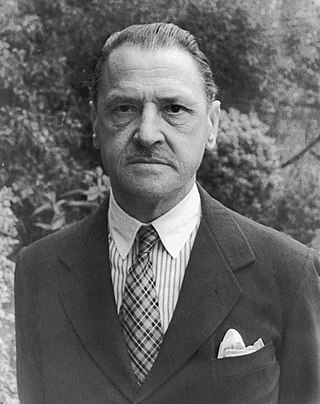
William Somerset Maugham was an English writer, known for his plays, novels and short stories. Born in Paris, where he spent his first ten years, Maugham was schooled in England and went to a German university. He became a medical student in London and qualified as a physician in 1897. He never practised medicine, and became a full-time writer. His first novel, Liza of Lambeth (1897), a study of life in the slums, attracted attention, but it was as a playwright that he first achieved national celebrity. By 1908 he had four plays running at once in the West End of London. He wrote his 32nd and last play in 1933, after which he abandoned the theatre and concentrated on novels and short stories.

Apia is the capital and only city of Samoa. It is located on the central north coast of Upolu, Samoa's second-largest island. Apia falls within the political district (itūmālō) of Tuamasaga.

Pago Pago is the capital of American Samoa. It is in Maoputasi County on Tutuila, the main island of American Samoa.

The Razor's Edge is a 1944 novel by W. Somerset Maugham. It tells the story of Larry Darrell, an American pilot traumatized by his experiences in World War I, who sets off in search of some transcendent meaning in his life. Maugham is the narrator whose narration takes the form of relating his conversations and reactions to the characters. He finds Larry both mystifying and compelling. The story begins through the eyes of Larry's friends and acquaintances as they witness his personality change after the war. His rejection of conventional life and search for meaningful experience allows him to thrive while the more materialistic characters suffer reversals of fortune.

Upolu is an island in Samoa, formed by a massive basaltic shield volcano which rises from the seafloor of the western Pacific Ocean. The island is 75 kilometres long and 1,125 square kilometres in area, making it the second largest of the Samoan Islands by area. With approximately 145,000 inhabitants, it is by far the most populous of the Samoan Islands. Upolu is situated to the southeast of Savai'i, the "big island". Apia, the capital, is in the middle of the north coast, and Faleolo International Airport at the western end of the island. The island has not had any historically recorded eruptions, although there is evidence of three lava flows, dating back only to between a few hundred and a few thousand years ago.
Sadie Thompson is a 1928 American silent drama film that tells the story of a "fallen woman" who comes to Pago Pago to start a new life, but encounters a zealous missionary who wants to force her back to her former life in San Francisco. The film stars Gloria Swanson, Lionel Barrymore, and Raoul Walsh, and it is one of Swanson's more successful films. Due to the public's apathy towards silent films, a sound version was prepared in the latter half of 1928. While the sound version has no audible dialog, it features a synchronized musical score with sound effects along with a theme song.

German Samoa was a German protectorate from 1900 to 1920, consisting of the islands of Upolu, Savai'i, Apolima and Manono, now wholly within the Independent State of Samoa, formerly Western Samoa. Samoa was the last German colonial acquisition in the Pacific basin, received following the Tripartite Convention signed at Washington on 2 December 1899 with ratifications exchanged on 16 February 1900. It was the only German colony in the Pacific, aside from the Jiaozhou Bay Leased Territory in China, that was administered separately from German New Guinea.
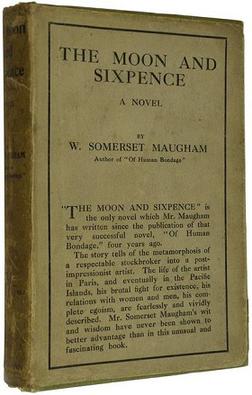
The Moon and Sixpence is a novel by W. Somerset Maugham, first published on 15 April 1919. It is told in episodic form by a first-person narrator providing a series of glimpses into the mind and soul of the central character, Charles Strickland, a middle-aged English stockbroker, who abandons his wife and children abruptly to pursue his desire to become an artist. The story is, in part, based on the life of the painter Paul Gauguin.

Cakes and Ale, or, The Skeleton in the Cupboard (1930) is a novel by the British author W. Somerset Maugham. Maugham exposes the misguided social snobbery levelled at the character Rosie Driffield, whose frankness, honesty, and sexual freedom make her a target of conservative opprobrium. Her character is treated favourably by the book's narrator, Ashenden, who understands that she was a muse to the many artists who surrounded her, and who himself enjoyed her sexual favours.
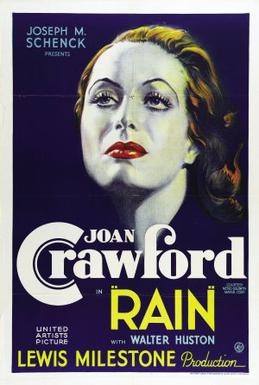
Rain is a 1932 pre-Code drama film that stars Joan Crawford as prostitute Sadie Thompson. Directed by Lewis Milestone and set in the South Seas, the production was filmed in part at Santa Catalina Island and what is now Crystal Cove State Park in California. The film also features Walter Huston in the role of a conflicted missionary who insists that Sadie end her evil ways, but whose own moral standards and self-righteous behavior steadily decay. Crawford was loaned out by MGM to United Artists for this film.
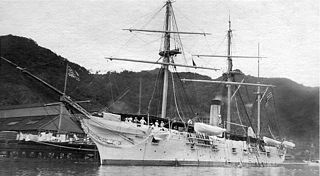
USS Adams was a screw gunboat and the lead ship of the Adams class.

The Casuarina Tree is a collection of short stories by W. Somerset Maugham, set in the Federated Malay States during the 1920s. It was first published by the UK publishing house Heinemann on September 2, 1926. The first American edition was published on September 17, 1926 by George H. Doran. It was re-published by Collins in London under the title The Letter: Stories of Crime. The book was published in French translation as Le Sortilège Malais (1928) and in Spanish as Extremo Oriente (1945).

For Services Rendered is a play by Somerset Maugham. First performed in London in 1932, the play is about the effects of World War I on an English family.

The Samoan crisis was a standoff between the United States, the German Empire, and the British Empire from 1887 to 1889 over control of the Samoan Islands during the First Samoan Civil War.
Aggie Grey was born in Western Samoa in 1897 and died in 1988. She was a well-known hotelier and founder of Grey Investment Group and Aggie Grey's Hotel.
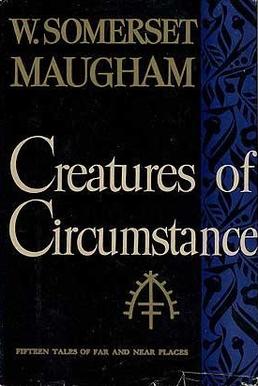
Creatures of Circumstance is a collection of 15 short stories by the British writer W. Somerset Maugham, first published by William Heinemann in 1947. It was the last collection of stories prepared by the writer.

"Rain" is a short story by the British writer W. Somerset Maugham. It was originally published as "Miss Thompson" in the April 1921 issue of the American literary magazine The Smart Set, and was included in the collection of stories by Maugham The Trembling of a Leaf.

Lady Frederick is a comedy by the British writer W. Somerset Maugham, written early in his career. The play was first seen in London in 1907, and was very successful, running for 422 performances. The title role was played by Ethel Irving. In New York it was first performed in 1908, with Lady Frederick played by Ethel Barrymore, who reprised her role in the play's film adaptation, The Divorcee.
Mano Togamau was a Western Samoan politician. He served as a member of the Legislative Assembly in two spells from 1964 and as Minister of Lands from 1976 until his death two years later.

The Samoa Shipping Corporation is a government-owned company in Samoa which provides freight and passenger services between Savai'i, Upolu and American Samoa. Established in 1974, the corporation is managed as a public trading body under the Public Bodies Act 2001.
References
- ↑ "Maugham, W(Illiam) Somerset 1874-1965" encyclopedia.com. Retrieved 24 August 2022.
- ↑ "The Trembling of a Leaf: Little Stories of the South Sea Islands". Library of Congress Catalogue. Washington: Library of Congress . Retrieved 24 August 2022.
- ↑ Page 244–245 Samuel J. Rogal, A William Somerset Maugham Encyclopedia. Greenwood Publishing Group, 1997.
- ↑ "William Somerset Maugham" LiteratureApp. Retrieved 24 August 2022.
- ↑ "JONATHAN LIS TE NS TO PLAYS Hibiscus Lure And A Deserted Fiancee", The Wireless Weekly: The Hundred per Cent Australian Radio Journal, vol. 35, no. 41, Sydney: Wireless Press, October 12, 1940, nla.obj-720735107, retrieved 16 March 2024– via Trove